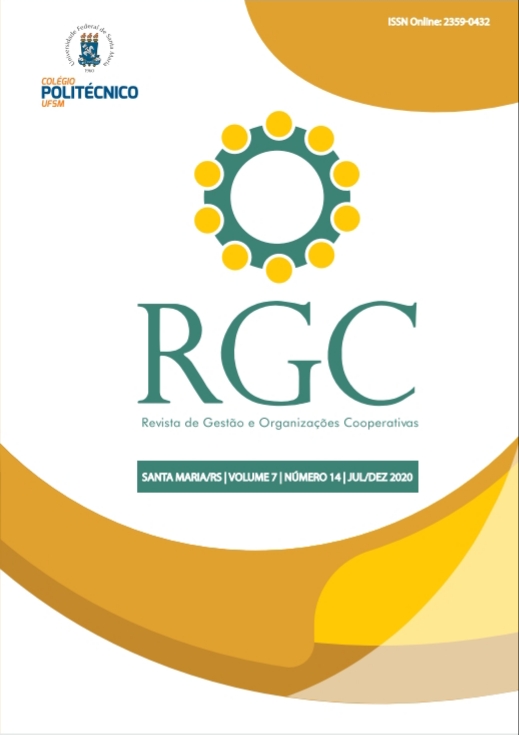Risks of barter in agribusiness: An analysis of a risk management model for cooperatives
DOI:
https://doi.org/10.5902/2359043240779Keywords:
Risk management models, agribusiness, cooperatives, barter operationsAbstract
On barter operations the involved agents are producers, cooperatives and Traders (suppliers). In this context cooperatives play a role of brokers allowing an approaching among agents and minimizing credit risks. The goal of this research is to assess a risk management model for barter operations. It was developed based on literature on protocols of risk management, resulting on a hybrid model which provides identification, assessment and possible responses to deal with risks. The model was applied on an agro industrial cooperative considering the perspectives of the involved agents. Content analysis of interviews and documents was used in the research aiming at identification of risks. Then, it was made an assessment of risks regarding their occurrence probability and impact on results, thus allowing the building of risk matrices for the agents. So, it was possible to assess strategies for risk responses considering the perspectives of producers, cooperative and Trader. Results contribute for a dissemination of risk management practices for barter in agribusiness.Downloads
References
ABNT NBR ISO 31000, de 2018. Gestão de riscos – princípios e diretrizes. São Paulo: Associação Brasileira de Normas Técnicas, 2018.
BELIK, W. O financiamento da agropecuária brasileira no período recente. Texto para discussão n. 2028. Instituto de Pesquisa Econômica Aplicada (IPEA), Brasília, 2015.
BRASIL. Ministério da Agricultura. Plano agrícola e agropecuário 2016/17. Brasília, 2016. Disponível em: http://www.agricultura.gov.br/pap. Acesso em: 24 mar. 2017.
BORGERTH, V. M. C. Sox: Entendendo a Lei Sarbanes – Oxley. Rio de Janeiro: Thomson, 2006.
CHING, H. Y. Contribuição das boas práticas do mercado para eficiência na gestão de risco corporativo. Revista Brasileira de Estratégia, v. 4, n. 3, p. 257-273, 2011.
CHING, H. Y.; COLOMBO, T. M. Boas práticas de gestão de risco corporativo: estudo de dez empresas. Revista Brasileira de Estratégia, v. 6, n. 1, p. 23-35, 2013.
COSO. Committee of Sponsoring Organizations of the Treadway Commission. Gerenciamento de riscos corporativos: estrutura integrada. (2007). Disponível em: https://www.coso.org/Documents/COSO-ERM-Executive-Summary-Portuguese.pdf. Acesso em: 24 mar. 2018.
DAMODARAN, A. Gestão estratégica do risco: uma referência para a tomada de riscos empresariais. Porto Alegre: Bookman, 2009.
DIAS, S. V. S. Auditoria de Processos Organizacionais. 2 ed. São Paulo: Atlas, 2008.
DIAS, S. V. S. Manual de Controles Internos. São Paulo: Atlas, 2010.
FAMÁ, R.; CARDOSO, R. L.; MENDONÇA, O. Riscos financeiros e não financeiros: uma proposta de modelo para finanças. Cadernos da FACECA, Campinas, v. 11, n. 1, 33-55; Jan./Jun., 2002
IFAC, International Federation of Accountants. Enhancing shareholder wealth by better managing business risk. New York: IFAC, 1999.
LOYOLA, P.; MOREIRA, V. R.; VEIGA, C. P. Analysis of the Brazilian Program of Subsidies for Rural Insurance Premium: evolution from 2005 to 2014. Modern Applied Science, v. 10, n. 7, p. 87-98, 2016. Disponível em: http://ccsenet.org/journal/index.php/mas/article/view/55796. Acesso em: 30 jul. 2017.
MARTINS, G. A. Estudo de caso: uma estratégia de pesquisa. São Paulo: Atlas, 2006
MOREIRA, V. R.; SOUZA, A.; DUCLÓS, L. C. Avaliação de retornos e riscos na comercialização do milho: estudo de caso usando value-at-risk. Revista de Economia e Sociologia Rural, Brasília, DF, v. 52, n. 2, p. 303-322, 2014.
MOREIRA, V. R.; FREIER, A.; VEIGA, C. P. A review of concepts, strategies and techniques management of market risks in agriculture and cooperatives. International Business Management. V. 10, n. 6, 739-750, 2016.
MOREIRA, V. R.; KURESKI, R.; VEIGA, C. P. Assessment of the economic structure of Brazilian agribusiness. The Scientific World Journal, v. 2016, 2016. Disponível em: https://www.hindawi.com/journals/tswj/2016/7517806/. Acesso em: 18 jul. 2017.
OZAKI, V. A. O papel do seguro na gestão do risco agrícola e os empecilhos para o seu desenvolvimento. Revista Brasileira de Risco e Seguro, Rio de Janeiro, v. 2, n. 4, p. 75-92, out./mar. 2007.
PADOVEZE, C. L.; BERTOLUCCI, R. G. Gerenciamento do Risco Corporativo em Controladoria: Enterprise Risk Management (ERM). 2 ed. São Paulo: Atlas, 2013.
PARANÁ COOPERATIVO. Financiamento agrícola: LCA ganha peso na estratégia de crédito do governo federal. Informe Paraná Cooperativo. 2016. Disponível em: http://www.paranacooperativo.coop.br/ppc/index.php/sistema-ocepar/comunicacao/2011-12-07-11-06-29/ultimas-noticias/109308-financiamento-agricola-lca-ganha-peso-na-estrategia-de-credito-do-governo-federal. Acesso em: 24 mar. 2017.
SILVA, F. P. Financiamento da cadeia de grãos no Brasil: o papel das tradings e fornecedores de insumos (Dissertação de mestrado). Universidade Estadual de Campinas, Instituto de Economia, Campinas, SP, Brasil. 2012. Disponível em: http://repositorio.unicamp.br/handle/REPOSIP/286009. Acesso em: 23 mar. 2018.
Downloads
Published
Versions
- 2022-05-25 (2)
- 2020-09-23 (1)
How to Cite
Issue
Section
License
Copyright (c) 2020 Altevir Costa Sanches, Vilmar Rodrigues Moreira, Carlos Augusto Candeo Fontanini

This work is licensed under a Creative Commons Attribution-NonCommercial-ShareAlike 4.0 International License.
Authors who publish in this journal agree to the following terms:
- Authors retain copyright and grant the journal the right of first publication, with work simultaneously licensed under the Creative Commons Attribution License that allows the sharing of work with acknowledgment of authorship and initial publication in this journal.
- Authors are authorized to enter additional contracts separately for non-exclusive distribution of the version of the work published in this journal (eg, publishing in institutional repository or as a book chapter), with acknowledgment of authorship and initial publication in this journal.
- Authors are allowed and encouraged to post and distribute their work online (eg, in institutional repositories or on their personal page) at any point before or during the editorial process, as this can bring about productive change as well as increase impact and impact. citation of published work (See The Effect of Free Access).







